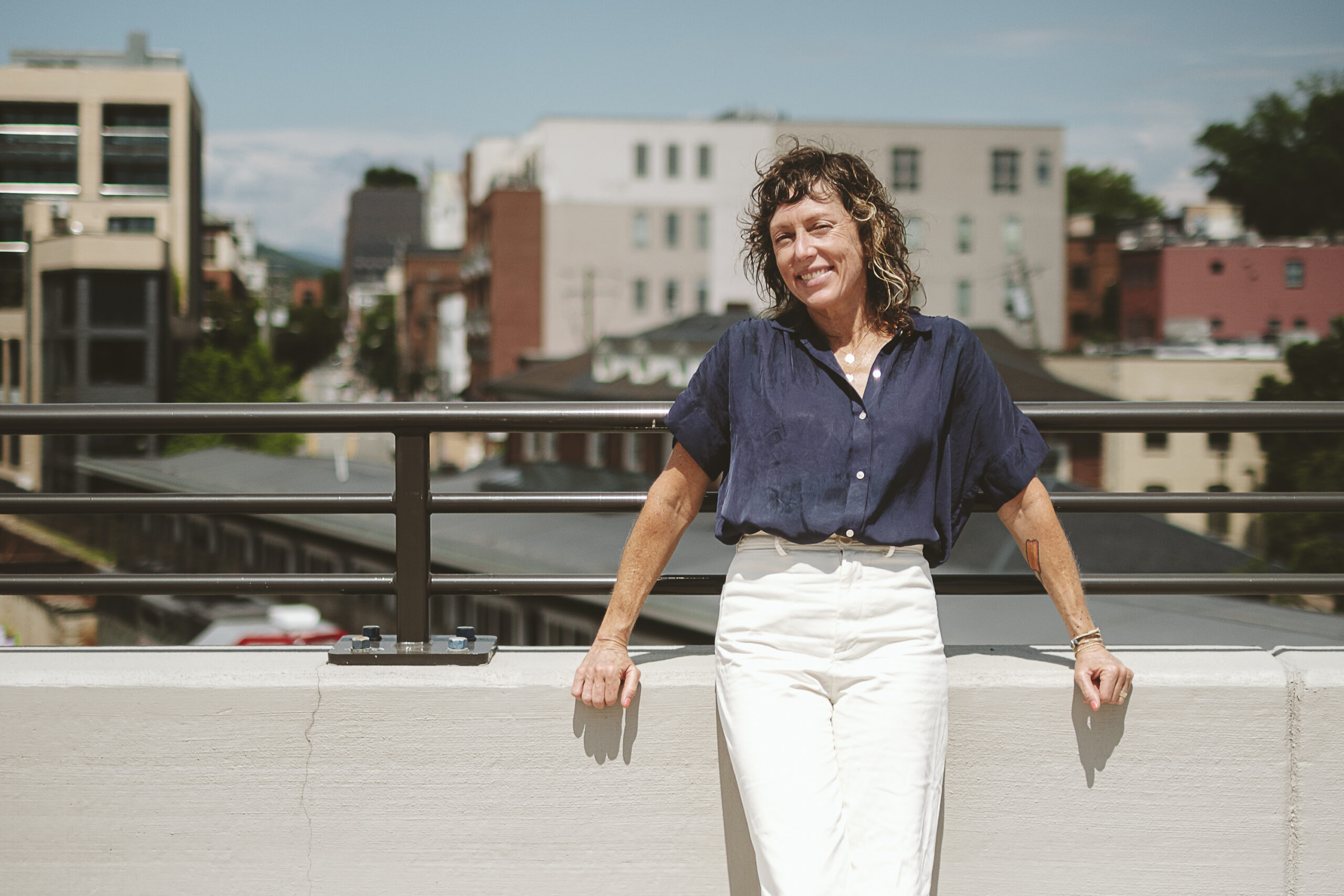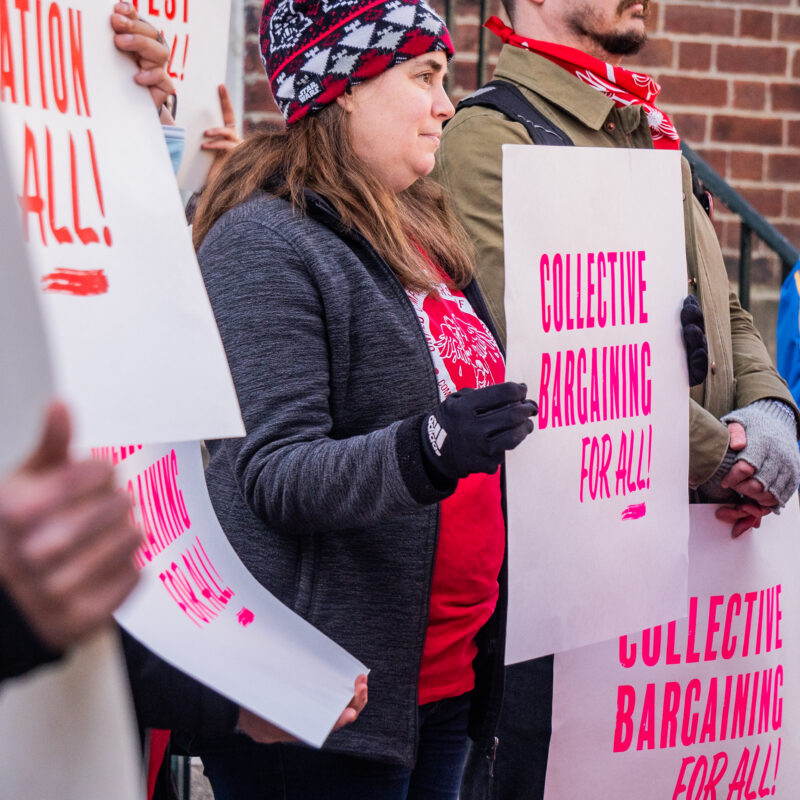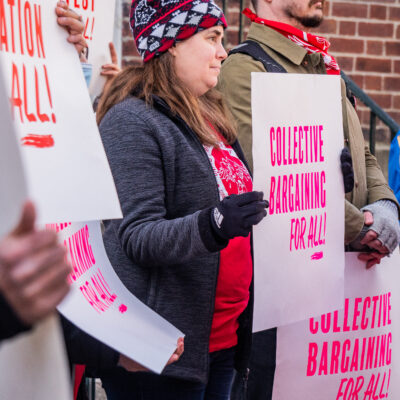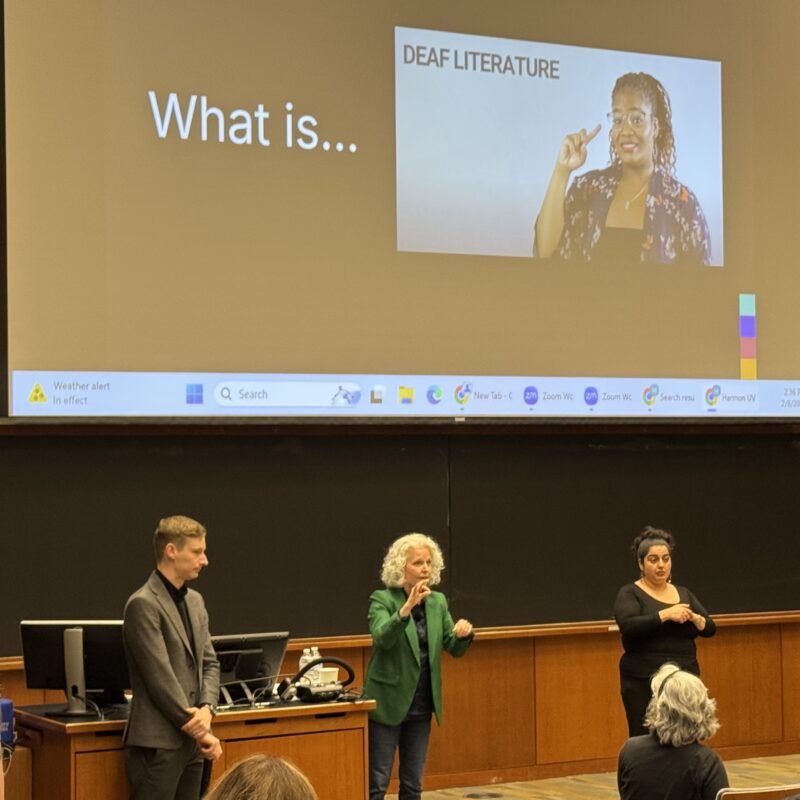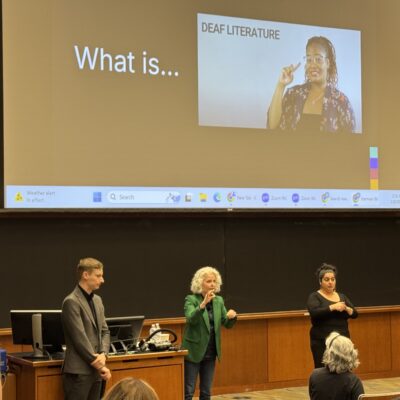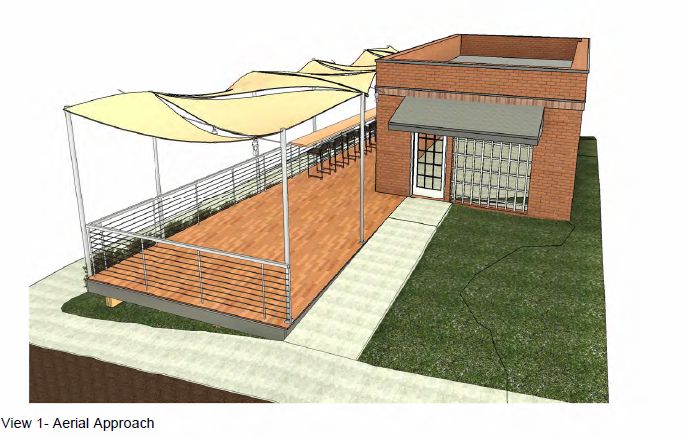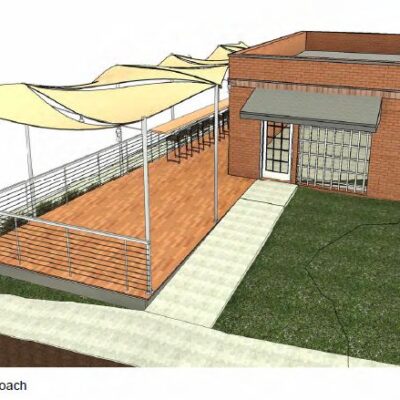Even before Jen Fleisher became an official Charlottesville City Council candidate, she was a public figure—or at least a quasi public figure. Not public figure classic, but public figure lite.
A Virginia Department of Health official since March 2020, she led the Blue Ridge Health District’s mobile COVID vaccination efforts. Fleisher spoke often with the local news back then—and regularly in the five years since everyone discovered sourdough.
She spent 20 years playing upright bass in the country band Jim Waive and the Young Divorcees. They opened for, among other acts, Kenny Rogers, Randy Travis, one Everly Brother, and Dwight Yoakam. Fleisher still speaks covetously of Yoakam’s outfits.
“He had this incredible wardrobe,” she says during one of two long chats we had in recent weeks. “He had two rolling wardrobes. I was sitting there and they were open, and I was with my pedal steel player”—more of us should have pedal steel players—“and I was like rifling through the wardrobe.”
Who hasn’t been tempted by fringe? Back at the health department, where there isn’t much fringe for some reason, Fleisher’s day job also demands she present to City Hall, in the counties, and for various local deliberative bodies, including Charlottesville’s five-member City Council.
Right now, Fleisher’s overseeing the BRHD’s accessibly named Community Health Improvement Plan. This edition of the CHIP, refreshed every three years, has four prongs (that, not coincidentally, overlap with Fleisher’s policy priorities): improving transportation infrastructure and transit reliability; supporting health-care workers; increasing internet access and technological acumen (especially in the district’s rural areas); and expanding mental and behavioral health treatment.
“At those meetings,” Fleisher says, “I heard a lot of times, ‘Oh, if you want that thing to change about transportation, that’s a City Council decision’ or ‘that’s a budget decision.’ ‘If you want this to change, you need to change that at the legislative level.’ And I was like, well, clearly I need to be involved with that if I want to make a difference.”
So she got involved.
Fleisher registered for the Democratic primary just 10 days before the deadline on March 17, which was also her 51st birthday and thus possibly a sign of providence. In June, during Charlottesville’s first go at ranked-choice voting, Fleisher won leisurely in the two-seat race.
With 18 percent of the city’s eligible voters showing up, she got a race-best 51 percent of the vote (3,184 votes) and unseated Vice-Mayor Brian Pinkston (13 percent) on her way to the November 4 general election and becoming a real life, honest-to-Zeus public figure.
“As naive as this is going to sound,” Fleisher says, while considering her new local status a month later, “it didn’t occur to me how much pressure there would be in the role of the campaigner, in being public facing, because I’ve played a couple-thousand-seat venues; I’m on the news all the time for the health department; I’ve presented to City Councils and Boards of Supervisors. In COVID, we were in the national spotlight a lot—thousands of people looking to me to make decisions on vaccinations and how people would get vaccinated. I thought: ‘Okay, I’ve already paid those dues.’”
And yet…
“I find myself wearing mascara all the time and driving slower,” Fleisher says, laughing. “I feel like at any minute someone will call me out for something and I need to be prepared. … I don’t think I took too seriously how I felt under the public eye, under scrutiny—and I think more of it was in my mind, honestly.
“You get so many requests for press and you’re constantly being judged and criticized—you should be. Because I’m trying to apply for this job, and you are the public, and I am applying to you, and you should ask me the questions that you want answered and make sure I’m the right one for the job. I understand where that comes from. It’s just a very binary world, to be campaigning. There is little room for gray, which is what the world really is, and I found that a little disheartening, honestly. But also a little disarming.”
Fleisher is in her home office/music studio. It has wood-paneled walls like basements of a certain vintage, although this is not a basement. It’s just lit like one. Her husband, Jesse Fiske, has arranged guitars and basses like clerestory windows high across one wall. The desk from which Fleisher Zooms me can be stowed if anyone has the urgent need to jam.
A week later, we met in person at Barbie’s Burrito Barn, where little Frida Kahlo shrines really tie the interior design together. But it was sunny, so we had lunch outside at a picnic table under a tree.
Fleisher arrived punctually via electric bicycle. She’s about as tall as you’d think she’d be and has tattoos that wouldn’t look right on other people. Anne Rice might have described her eyes as “preternatural,” though I’m certain Fleisher’s not a vampire.

A 1996 University of North Carolina graduate, Fleisher majored in journalism and minored in music after a Mingus-centered childhood in the inland Fort Lauderdale suburb of Plantation, Florida, population nearly 100,000. She went back to UNC for a master’s degree in public health, graduating in 2019.
In between degrees, Fleisher taught photojournalism in Cape Town and did graphic design in Chicago. At the esteemed firm VSA Partners, Fleisher helped craft the look and feel of an early Aetna website and did some light and miscellaneous web work for Harley-Davidson.
She fled Chicago in 2001 after the dot-com crash. Her college roommate, a native Charlottesvillian, sold a spontaneous Fleisher on decamping to Virginia. Fleisher started a graphic design business here in 2004 (her campaign literature is homemade) and since then she’s lengthened her résumé, becoming a yoga instructor, then a prenatal yoga instructor, inevitably a doula and almost a midwife.
“I had a really poignant phone call with a woman who was a midwife who ran birth centers, but also had a master’s in public health from Harvard,” Fleisher says. “She was like, ‘I don’t know any midwives who can design their own website. I really think you should get into policy instead of clinical. You don’t really sound like a clinician to me. Like, can you imagine doing pap smears in a hospital all day long?’ And I was like, ‘No.’ And she’s like, ‘Plus, this guy Trump’s talking about running for office so we’re going to need a lot of policy.’ That was in the 2016 election.”
Fleisher had been on a nursing track. Today, she’s a veteran doula. She says she’s assisted with the births of about 150 babies and that in her prime she used to do two a month. Now it’s more like two a year, though she was on call for a birth during our lunch at Barbie’s. She had a burrito bowl and wore mascara.
“Yeah, I mean, I don’t like wearing mascara,” Fleisher says. “And driving slower—I found myself doing that because here I very much am trying to change the transportation system, right? I’m trying to get really upstream and make you healthier through better transportation. I couldn’t get a speeding ticket. I couldn’t be seen, you know, idling in a car in a parking lot for a long time.”
Fleisher means everyday basic stuff about public transportation, like prompt buses and bus stops with roofs, protected bike lanes, more/better sidewalks and crosswalks. Her philosophy, both life and political, is that life is public health and everything affects everything else.
“It’s all the pieces that we don’t consider,” Fleisher says. “[For example], if you delay developing this vaccine because you don’t convene the group that signs off on it, [then] six months later it’s flu season [and] I don’t have a vaccine. What happens if you’re immunocompromised? Is there now a run on vaccines? Can it only happen for people who can afford it? What does that do to, not only the working population, but the child-care and schooling population? Can kids go to school if they don’t get vaccines? And now what’s happening to the safety of our teachers and our staff?
“… There’s a lot of nuance in health and in population health and public health in general, and these very binary decisions are going to create a lot of nuanced problems, and we are going to be limited in what we can do to prevent or mitigate those problems, and that really worries me.”
Fleisher first thought of running for City Council in spring-ish 2024 while lamenting the limits of being a figure who is public, but not quite a public figure.

As a health department official, she’s led a program to get free vaccinations and physicals for uninsured kids, whipped up help from local agencies and organizations to implement CHIP initiatives, and personally driven the mobile COVID vaccination RV. But she couldn’t get big policy stuff done (or fund it) without City Council.
“This was going to be the first ranked-choice election in Charlottesville and that seemed like a great opportunity,” Fleisher says. “If you’re going to jump in the game, do it when there’s ranked-choice voting. That was enticing. At home, my son’s 15. He can do his own thing. He can get himself everywhere on his bike and he’s very self-sufficient, and my husband’s job has stabilized,”—Fiske is the facilities director for the Bread & Table restaurant group and the front man for the band Jesse’s House—“and as a family we were like, ‘All right, we’re each doing our own thing.’
“It seemed like I could have waited and really tested it out, but I think in running for public service, City Council, any kind of public service, it’s kind of like trying to decide when to have a child. It’s never a good time to have a kid. You never have enough money; you never have enough time. It’s the same.”
And so Jen Fleisher decided to go public. Officially public. She even, against her nature, heart, and soul, started posting on social media. Because you can’t run for elected office and not post on social media.
Fleisher’s now active, if only perfunctorily, on Facebook, Instagram, and Bluesky, but elegantly silent on LinkedIn. Instagram would be her grudging favorite, even if it requires mascara.
“It’s your self-awareness and it’s really your self-esteem, and you’ve got to manage both,” Fleisher says of running for office. “I had never thought before of what do I look like to you outside? Or how are the optics of this moment? Optics had never occurred to me before. In your real life, you don’t put your best foot forward all the time, right? You’ve got food in your teeth. You yelled at someone you didn’t need to. You slipped and fell—life is full of these bloopers that we generally take with a grain of salt, but when you’re under that microscope of the public eye, there’s less tolerance for that.
“That’s where that binary comes in. You’re either for or against this. You’re either for this platform or you’re against it. I found it very hard to say [clearly and concisely], ‘Yes, I’m for these things because I’ve seen these things go this way.’ … You really have to get down to capsulated microstatements so the press can publish it and the people can understand it and be very concrete all the time, and that I just found challenging because it’s not how you live your life when you aren’t under the microscope—am I not answering your question?”
She was. She’s just still new at being public figure classic.
Featured Image: Eze Amos.
